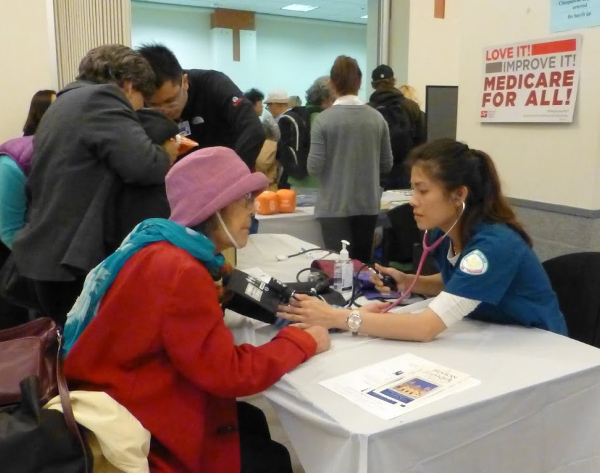
PHOTO/MEDICARE FOR ALL COALITION
SAN JOSE, CA — Despite massive rollout efforts, Covered California (ACA and Medicaid Expansion), have not yet proved the long-term healthcare solution for the over 6000 people still living outdoors in Silicon Valley. Homeless people still get most of their medical care from Emergency Rooms, and clinics and vans providing mostly episodic care. Nationally, 30,000,000 people are still uninsured.
Attendance was up 2-3 times at a yearly winter health fair for the homeless at St. Joseph’s Cathedral in San Jose. Although 75 flu shots were given, and people participated in glucose and cholesterol tests, etc., what the attendees appreciated most were basic comfort items such as warm clothes, blankets, haircuts, foot washing and a healthy lunch.
The connection between lack of housing and health is obvious. Without access to clean water, sanitation, cooking, healthy food, a warm bed and safety, it is pretty hard to be healthy. The extreme trauma and stress that are part of everyday life for people living rough is compounded by the callous tossing of camps by police, with destruction of precious personal property like blankets, warm clothes, medicines and tarps.
While the average life expectancy in the U.S. is 78, long-term homeless people have a life expectancy of only 42 to 52 years! The sick and vulnerable become homeless, and the homeless become sicker and more vulnerable. Loss of a job is often the tipping point to homelessness, but often illness or injury precipitate job loss, and since healthcare was historically tied to work in the US, loss of job has meant loss of healthcare.
One in four women are homeless because of domestic violence. Youth also become homeless due to violence, sexual abuse and other traumatic experiences. People without a home lack personal safety from assault and suffer from major depression, substance abuse and post-traumatic stress disorder.
The majority of adults who experience homelessness have more than one health issue, such as hypertension, diabetes, HIV or viral hepatitis. Managing chronic illnesses is always challenging, but nearly impossible while homeless. Taking medicines at certain times or with meals is important to control blood sugar in diabetes. Not so easy when the next meal is hard to find so patients must skip doses. Irregular doses or doses without food can increase the risk for heart attacks, strokes, kidney failure and blindness. Other life-saving medications like asthma inhalers are often lost or stolen. Medications which have to be refrigerated are not possible. Often, moment to moment survival just takes precedence over healthcare.
Programs like health fairs are incremental at best. But, the cooperative spirit that brought over one hundred people to volunteer to help homeless community members get healthcare and comfort for one day is a powerful start. Combined with political education and organization, that community spirit can fight for the kind of housing and kind of society necessary to end both homelessness and poor health.
